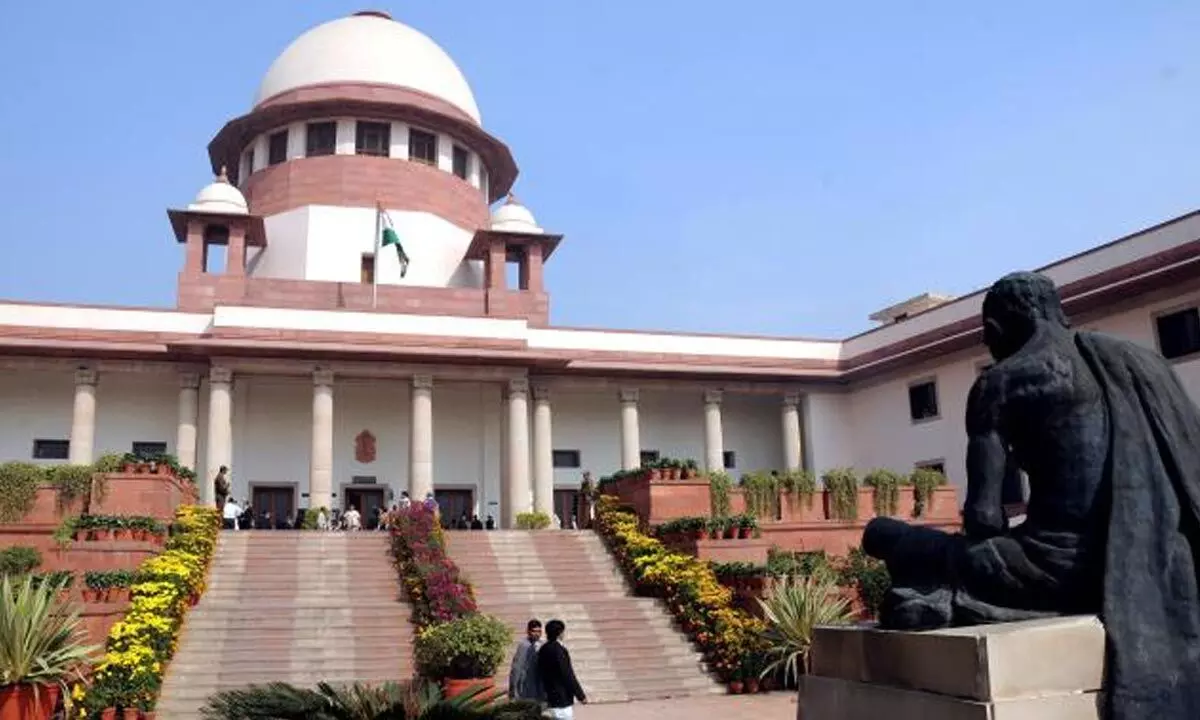Live
- All you need to know about PAN 2.0
- Akasa Air redefines travel experience with industry-first offerings
- MP: Residents stage protests against liquor shop in Indore
- Telugu Actor Shri Tej Booked for Alleged Cheating and False Promise of Marriage in Live-in Relationship
- Toyota Kirloskar Motor Celebrates 1 Lakh Urban Cruiser Hyryder on Indian Road
- MLS: New York City FC part ways with head coach Nick Cushing
- Delhi CM says Centre cutting AAP voters’ names from rolls, BJP hits back
- Hyderabad Metro Rail Phase-II Works to Begin in Old City in January 2025
- Odisha: 668 persons killed in human-elephant conflicts in last three years
- DEFENDER JOURNEYS: TO EMBARK ON ITS THIRD EDITION FROM NOVEMBER 2024
Just In
Tax exemption benefit for institutions if solely engaged in education: Supreme Court


Supreme Court of India
The Supreme Court on Wednesday said that trusts or institutions can claim benefits of tax exemptions, only if they are "solely" engaged in education and not in any profit activity.
New Delhi: The Supreme Court on Wednesday said that trusts or institutions can claim benefits of tax exemptions, only if they are "solely" engaged in education and not in any profit activity.
A bench, headed by Chief Justice U.U. Lalit and comprising Justices S. Ravindra Bhat and P.S. Narasimha, said in a knowledge-based, information-driven society, true wealth is education - and access to it.
It added that every social order accommodates, and even cherishes, charitable endeavours, since it is impelled by the desire to give back what one has taken or benefitted from society.
"Our Constitution reflects a value which equates education with charity. That it is to be treated as neither business, trade, nor commerce, has been declared by one of the most authoritative pronouncements of this court in T.M.A Pai Foundation (judgment). The interpretation of education being the 'sole' object of every trust or organisation which seeks to propagate it, through this decision, accords with the constitutional understanding and, what is more, maintains its pristine and unsullied nature," said the bench, in its 52-page judgment.
The bench said it is held that the requirement of the charitable institution, society or trust etc., to "solely" engage itself in education or educational activities, and not engage in any activity of profit, means that such institutions cannot have objects which are unrelated to education.
"In other words, all objects of the society, trust etc., must relate to imparting education or be in relation to educational activities," it added.
Justice Bhat, who authored the judgment on behalf of the bench, said: "Where the objective of the institution appears to be profit-oriented, such institutions would not be entitled to approval under Section 10(23C) of the IT Act. At the same time, where surplus accrues in a given year or set of years per se, it is not a bar, provided such surplus is generated in the course of providing education or educational activities."
The top court delivered the judgment on a batch of cases filed by New Noble Educational Society and others against the orders of the Chief Commissioner of Income Tax. However, the top court clarified that the law declared would operate prospectively.
The bench said the seventh proviso to Section 10(23C), as well as Section 11(4A) refer to profits which may be "incidentally" generated or earned by the charitable institution. In the present case, the same is applicable only to those institutions which impart education or are engaged in activities connected to education, it added.
Justice Bhat said: "The reference to 'business' and 'profits' in the seventh proviso to Section 10(23C) and Section 11(4A) merely means that the profits of business which is 'incidental' to educational activity - as explained in the earlier part of the judgment i.e., relating to education such as sale of textbooks, providing school bus facilities, hostel facilities, etc."
The bench said the reasoning and conclusions in American Hotel judgment and Queen's Education Society judgment so far as they pertain to the interpretation of expression "solely" are hereby disapproved. The observations made in American Hotel suggested that the Commissioner could not call for the records and that the examination of such accounts would be at the stage of assessment, it noted.
"It is held that wherever registration of trust or charities is obligatory under state or local laws, the concerned trust, society, other institution etc. seeking approval under Section 10(23C) should also comply with provisions of such state laws. This would enable the Commissioner or concerned authority to ascertain the genuineness of the trust, society etc. This reasoning is reinforced by the recent insertion of another proviso of Section 10(23C) with effect from 01.04.2021," it said.

© 2024 Hyderabad Media House Limited/The Hans India. All rights reserved. Powered by hocalwire.com






